高中英语人教版必修三第一单元Festivals around the world 单词导学案(教师版)
- 格式:doc
- 大小:53.05 KB
- 文档页数:4
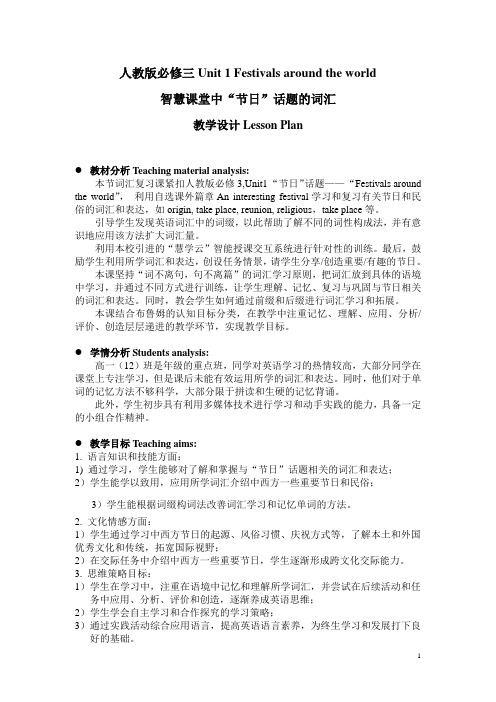
人教版必修三Unit 1 Festivals around the world智慧课堂中“节日”话题的词汇教学设计Lesson Plan●教材分析Teaching material analysis:本节词汇复习课紧扣人教版必修3,Unit1 “节日”话题——“Festivals around the world”,利用自选课外篇章An interesting festival学习和复习有关节日和民俗的词汇和表达,如origin, take place, reunion, religious,take place等。
引导学生发现英语词汇中的词缀,以此帮助了解不同的词性构成法,并有意识地应用该方法扩大词汇量。
利用本校引进的“慧学云”智能授课交互系统进行针对性的训练。
最后,鼓励学生利用所学词汇和表达,创设任务情景,请学生分享/创造重要/有趣的节日。
本课坚持“词不离句,句不离篇”的词汇学习原则,把词汇放到具体的语境中学习,并通过不同方式进行训练,让学生理解、记忆、复习与巩固与节日相关的词汇和表达。
同时,教会学生如何通过前缀和后缀进行词汇学习和拓展。
本课结合布鲁姆的认知目标分类,在教学中注重记忆、理解、应用、分析/评价、创造层层递进的教学环节,实现教学目标。
●学情分析Students analysis:高一(12)班是年级的重点班,同学对英语学习的热情较高,大部分同学在课堂上专注学习,但是课后未能有效运用所学的词汇和表达。
同时,他们对于单词的记忆方法不够科学,大部分限于拼读和生硬的记忆背诵。
此外,学生初步具有利用多媒体技术进行学习和动手实践的能力,具备一定的小组合作精神。
●教学目标Teaching aims:1. 语言知识和技能方面:1) 通过学习,学生能够对了解和掌握与“节日”话题相关的词汇和表达;2)学生能学以致用,应用所学词汇介绍中西方一些重要节日和民俗;3)学生能根据词缀构词法改善词汇学习和记忆单词的方法。
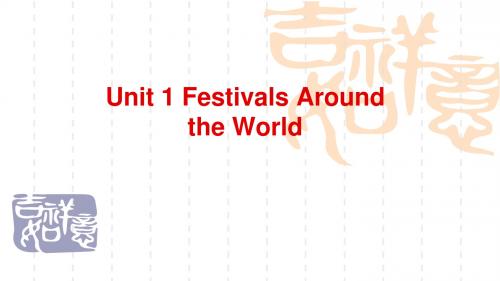
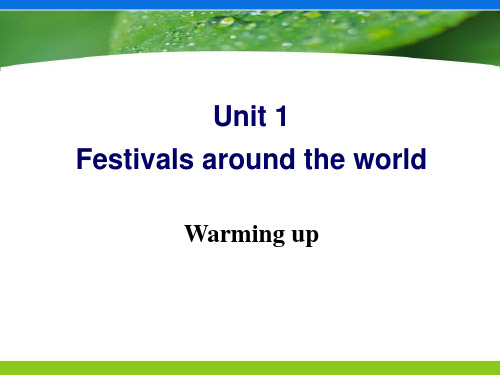
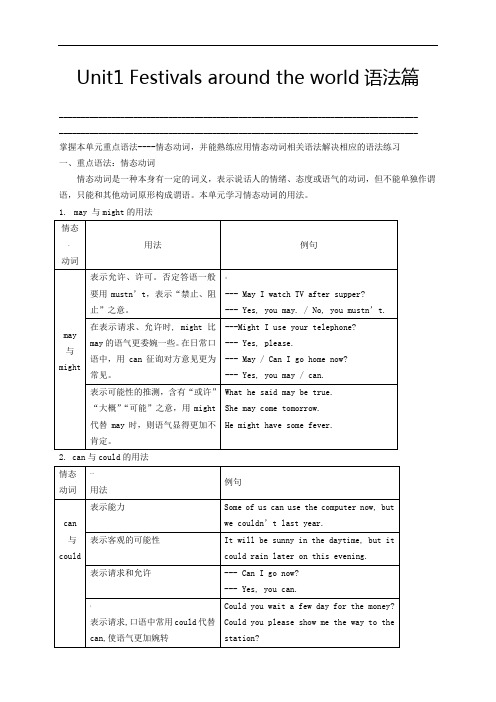
Unit1 Festivals around the world语法篇____________________________________________________________________________________________________________________________________________________________________掌握本单元重点语法----情态动词,并能熟练应用情态动词相关语法解决相应的语法练习一、重点语法:情态动词情态动词是一种本身有一定的词义,表示说话人的情绪、态度或语气的动词,但不能单独作谓语,只能和其他动词原形构成谓语。
本单元学习情态动词的用法。
1.may 与might的用法2. can与could的用法…3. will与would的用法4.shall与should的用法5. must, may (might) 和can表示“推测”的用法6.should与ought to用法;7.need与dare用法ed to与would用法例1.(2019北京卷27.)________ I have a word with you? It won’t take long.A. CanB. MustC. ShallD. Should解析:本题考察的是情态动词基本意义辨析。
can能够,可能;must必须,一定;非得;shall将要;:should应该;句意:我可以和你谈谈吗?不会花很多时间的。
根据句意可知本题使用Can I…?表示询问对方是否允许。
如:Can I use your dictionary? 我可以使用你的字典吗?答案:A。
例2.(2019大纲卷)30. Although you _____ find bargains in London, it’s not generally a cheapplace to shop.A. shouldB. needC. mustD. can解析:should应该,竟然;need需要;must必须,一定;非得,偏偏;can能够,可能,有时会…;根据句意“尽管你有时可能会在伦敦找到便宜货,但总得说来那不是一个购物的便宜的地方。
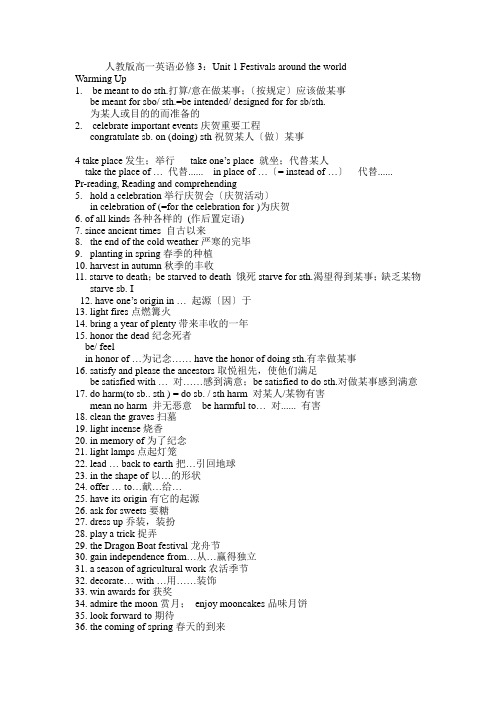
人教版高一英语必修3:Unit 1 Festivals around the worldWarming Up1.be meant to do sth.打算/意在做某事;〔按规定〕应该做某事be meant for sbo/ sth.=be intended/ designed for for sb/sth.为某人或目的的而准备的2.celebrate important events庆贺重要工程congratulate sb. on (doing) sth祝贺某人〔做〕某事4 take place发生;举行take on e’s place 就坐;代替某人take the place of …代替...... in place of …〔= instead of …〕代替......Pr-reading, Reading and comprehending5.hold a celebration举行庆贺会〔庆贺活动〕in celebration of (=for the celebration for )为庆贺6. of all kinds各种各样的(作后置定语)7. since ancient times 自古以来8.the end of the cold weather严寒的完毕9.planting in spring春季的种植10.harvest in autumn秋季的丰收11. starve to death;be starved to death 饿死starve for sth.渴望得到某事;缺乏某物starve sb. I12. have one’s origin in …起源〔因〕于13. light fires点燃篝火14. bring a year of plenty带来丰收的一年15. honor the dead纪念死者be/ feelin honor of …为记念…… have the honor of doing sth.有幸做某事16. satisfy and please the ancestors取悦祖先,使他们满足be satisfied with …对……感到满意;be satisfied to do sth.对做某事感到满意17. do harm(to sb.. sth ) = do sb. / sth harm 对某人/某物有害mean no harm 并无恶意be harmful to…对...... 有害18. clean the graves扫墓19. light incense烧香20. in memory of为了纪念21. light lamps点起灯笼22. lead … back to earth把…引回地球23. in the shape of以…的形状24. offer … to…献…给…25. have its origin有它的起源26. ask for sweets要糖27. dress up乔装,装扮28. play a trick捉弄29. the Dragon Boat festival龙舟节30. gain independence from…从…赢得独立31. a season of agricultural work农活季节32. decorate… with …用……装饰33. win awards for获奖34. admire the moon赏月;enjoy mooncakes品味月饼35. look forward to期待36. the coming of spring春天的到来37.give children lucky money in red paper用红包装着压岁钱给小孩38. dragon dances舞龙灯39. the lunar New Year阴历新年40.day and night整天;日夜41.colorful clothing of all kinds各种艳丽的衣服42. Christian countries信奉基督教的国家43. be covered with被…罩着44. as though好似45.love to get together to eat, drink and have fun with each other喜欢聚在一起吃、喝、玩耍46.enjoy life享受生活47. forget our daily work for a little while暂时忘记日常生活中的烦恼Learning about language and using langbuage48. have a good time with和…一起开心49. at the parking lot在停车场50. be heart-broken心都碎了51. at the coffee shop在咖啡馆里;after work下班后52. turn up出现53. right now立即54. keep one’s word守信誉55. hold one’s breath屏气56. drown one’s sadness in coffee用咖啡来解愁57. wipe the table擦好桌子58. visit the earth下凡来到人间;(be) on earth在人间59. the herd boy牛郎60. set off for home动身回家61. remind sb. of …因…想起某人62.pass the tea shop on the corner路过在转角处的茶馆63. wave at sb. 向某人招手Workbook64. wipe all one’s tears拭去泪水;hide the sadness on one’s face掩盖住脸上的悲伤65. dream about going back to one’s homeland 日夜梦想回到祖国66. win the beat actor at the Golden Rooster Award 荣获金鸡奖的最正确男演员67.be ready for a second try准备第二次尝试68.leave sb. alone让某人一个人呆会69. full-time workers全职工70.have free time有时间71 ask for permission恳求答应72.have an eye examination参加一个视力检测73.sit in a café坐在咖啡厅里74.32 degrees below freezing零下32度75. pile… up along the sidewalks沿着人行道把…堆起来76. ride in horse carriage乘座马车77.admire the ice sculptures欣赏冰雕78. be dressed in heavy clothes穿了厚厚的衣服。
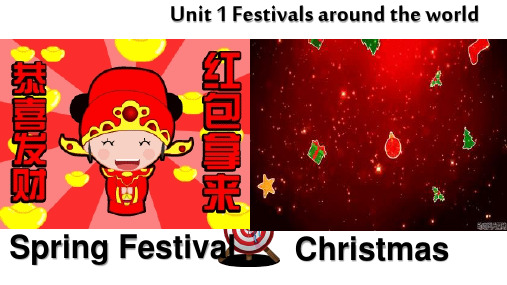


Festivals around the world单元要点归纳提升to deathto dofor starving starvationa strong belief holdinbeyond belief believebelieve in believe it or notfrom赢得时间体重增加增加力气/权力/经验一等奖;第一名 因……而获奖 为某人颁发奖品foradmiration钦佩地admiringforwith/without permitto dodoingto sb. forforapology因(做)某事向某人道歉接受/拒绝某人的道歉inin借酒消愁drowningdrownedto do使某人想起offordoing原谅某人某事不计前嫌oftake one's placein替代某人;顶替某人honour favour search place need charge praise case掩盖某事打扮某人;为某人化妆asin捉弄某人out ofintointo out up downdoingforof多么有趣呀!做某事很有趣over on out off in to down失信;食言;失约承认说错话;收回前言和……交谈和……争论总之换句话说out of lose catch take/have breath breathe breathlessup out aside down abouteither give them as gifts to friends or hang them in their housesWith the children at schoolas though our team is going to winIt is obvious thatcan make your study go to succeedSeeing my father's driving awayMay everyone be happymust be a big girl can't be cleaningwon't be easily torncan't fly Could you helpyou can understand mewill not forget to go over my lessoncould see must offershould avoid hurtingThe Spring Festival always reminds us of the family reunion There are all kinds of activities during the Spring Festival Children especially look forward to the Spring FestivalIt's also a good time for adultsThey can express appreciation, make an apology or forgive each other。


人教版高中英语必修三《Unit 1 Festivals around the World》教学设计Book 3 Unit 1 Festivals around the worldXXXWarming up and Reading教学设计课题:Book 3 Unit 1 Festivals around the world教材:XXX指导思想与理论依据:1.高中英语学科素养核心理论本单元的话题是世界各地的节日名称、由来及庆祝方式。
通过对这个话题的讨论和研究,让学生在多样的东西方节日、文化中进行比较,并发现节日文化的共性、多样性和民族独特性,增进对多种文化节日的理解及对中国传统文化的热爱与传承。
2.任务教学和合作探究本课是一节阅读课,在本单元中处于中心地位。
我将采用任务型教学法和小组合作探究研究法,扩大课堂语料输入量和学生的语料输出量,主要锻炼学生的听说与阅读能力。
教学背景分析:本课是高中英语必修三第1单元,学生围绕这一话题,了解世界各地的不同节日及庆祝方式,同时加深对中国传统文化的理解与传承。
学生已经初步具备了略读、跳读等阅读技巧以及确定主题句,预测材料内容等阅读微技能,但是很多学生英语基础相对较弱,语言交际能力相对较差。
很多学生求知欲旺盛,思维活跃,好胜心强,但研究缺乏主动性,有畏难心理。
因此,教师要通过精心设计使他们感兴趣的活动,用活动教学的方法来调动学生的研究积极性,在师生互动,生生互动的过程中完成教学任务并达到目标。
教学目标及重难点:教学目标:1.语言能力:能熟练谈论节日及相关庆祝活动2.文化品格:了解中外各种节日,加强对中国传统文化的理解和传承3.思维品质:通过对文章结构的把握,能熟练运用相关阅读技能把握文章细节4.研究能力:通过小组讨论培养学生合作研究的能力教学重点:掌握节日名称及相关庆祝活动,能熟练运用组织对话及文章,深入探究部分节日的深刻内涵,增强对节日的理解。
教学难点:运用相关知识进行对话和写作较难教学方式与手段:教学方式:启发式,合作探究式教学手段:PPT,视频,音频,图片教学流程:1.Warm-up通过展示图片和视频引入话题,让学生了解不同节日的庆祝方式和文化背景。

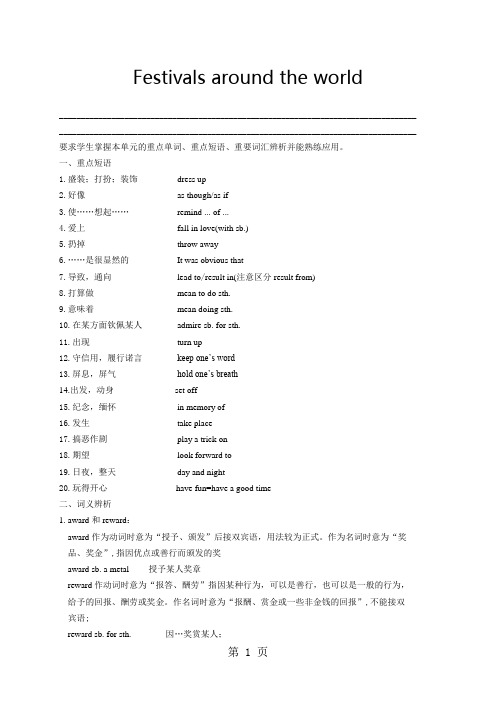
Festivals around the world__________________________________________________________________________________ __________________________________________________________________________________要求学生掌握本单元的重点单词、重点短语、重要词汇辨析并能熟练应用。
一、重点短语1.盛装;打扮;装饰dress up2.好像as though/as if3.使……想起……remind ... of ...4.爱上fall in love(with sb.)5.扔掉throw away6.……是很显然的It was obvious that7.导致,通向lead to/result in(注意区分result from)8.打算做mean to do sth.9.意味着mean doing sth.10.在某方面钦佩某人admire sb. for sth.11.出现turn up12.守信用,履行诺言keep one’s word13.屏息,屏气hold one’s breath14.出发,动身set off15.纪念,缅怀in memory of16.发生take place17.搞恶作剧play a trick on18.期望look forward to19.日夜,整天day and night20.玩得开心have fun=have a good time二、词义辨析1. award和reward:award作为动词时意为“授予、颁发”后接双宾语,用法较为正式。
作为名词时意为“奖品、奖金”,指因优点或善行而颁发的奖award sb. a metal 授予某人奖章reward作动词时意为“报答、酬劳”指因某种行为,可以是善行,也可以是一般的行为,给予的回报、酬劳或奖金。
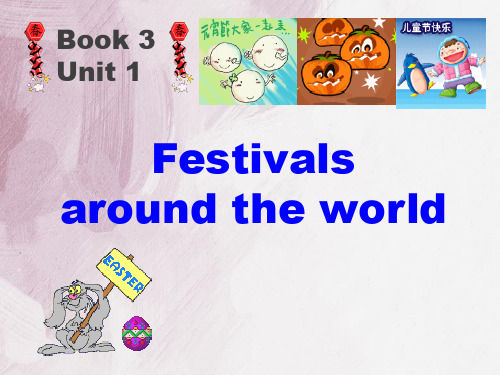
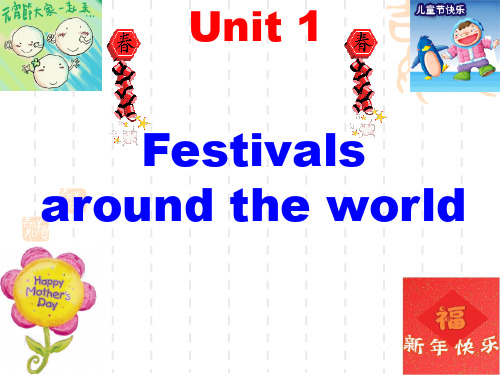
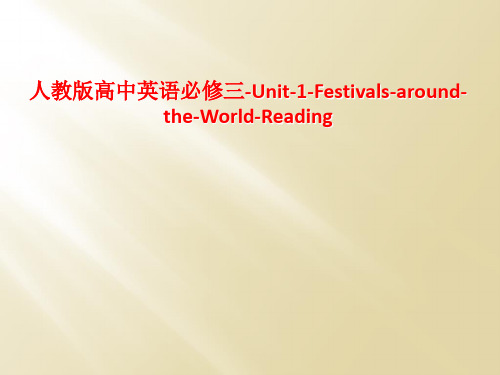

人教版高中英语必修3《Unit1Festivalsaroundtheworld》教案人教版高中英语必修3《Unit 1 Festivals around the world》教案教学准备教学目标(1) 增进学生对中国节日的理解,了解和感悟外国的节日;(2) 提高学生的社会文化素质,加强跨国文化素质;(3) 培养学生运用资源策略。
教学重难点(1) 本单元的生词和短语;(2) 掌握一些情态动词的基本用法;(3) 了解有关节日和民俗,掌握有关词汇,如custom,religious 等。
教学工具课件教学过程Step 1. Leading-inPurpose: To activate Ss and arouse them to express their opinions about a festival.Lead Ss to the content of this unit. Teacher may say, “Do you know what is called the Christmas of China? The Spring Festival. Yes. The oldest and most important festival in China is the Spring Festival. Each country and each nation has its own festivals. Today we are going to learn something about the different festivals.”Step 2. Warming Up1. Ask Ss to turn to P1 and work in groups to complete the form on P1.2. Ask Ss to discuss festivals they have filled in the form and their importance to the society. After that, ask Ss to present theiropinions to all classmates.Step 3. Pre-listeningPurpose: To help Ss learn about the context of the Listening text.Ask Ss to talk about the following questions to get them prepared to listen to the reading text.1. How many ancient festivals do you know?2. Are foreign festivals different from Chinese festivals? In what part?Step 4. ListeningPurpose: To get the main information in the listening part.To develop Ss’ listening abilityTo learn some information about the festivals around the world.Ask Ss to listen to the tape, focus on the subjects mentioned in the passage and then answer the following question.1. How many kinds of festivals were mentioned in the text?Suggested Answer: Five.2. What are they?Suggested Answer:Ancient FestivalsFestivals of the DeadFestivals to Honor PeopleHarvest FestivalsSpring FestivalsStep 5. Pre- readingDivide Ss into groups of four and ask them to discuss the following questions.1. What’s your favorite holiday of the year? Why?2. What festivals or celebrations do you enjoy in your city ortown? Do you like spending festivals with your family or with friends? What part of a festival do you like best---the music, the things to see, the visits or the food?Step 6. Fast readingAsk Ss to read the text quickly and answer the following questions.1. What are festivals of the dead usually for?2. What make autumn festivals happy events?3. What do people usually do at spring festivals?4. What is one important reason to have festivals and celebrations?5. Compare the festivals of the dead in Mexico, Japan and China. What things are similar? What things are different?Suggested Answers:1. Festivals of the dead are for honoring or satisfying dead ancestors or others, who some people believe might return to help or harm living people.2. Autumn festivals are happy events because people are thankful that food is ready for winter and the hard farm work is finished.3. At spring festivals, people usually have dances, carnivals and other activities to celebrate the end of winter and the coming of spring.4. It is important to have festivals and celebrations so we can enjoy life / be proud of our customs / forget our work for a little while.5. The Chinese, Japanese and Mexican festivals of the dead all have customs to honour the dead. The Chinese and Japanese go to clean their ancestors’ graves, and the Mexican offer food, flowers and gifts to the dead. However, there are somedifferences. The Mexicans eat special food that looks like bones, something the Chinese and Japanese do not do.Step 7. Intensive reading1. Ask Ss to read the text carefully and sum up the main idea of each part.2. Discuss in pairs which festivals you think are the most important and which are the most fun. Then fill in the chart with your ideas.Type of festival Example of festival Reasons for your choice Most importantMost funSuggested Answer:Various answers are acceptable.3. Ask Ss the following question and encourage Ss to give some similarities that they think festivals have, and give their reasons. Then invites Ss to tell the similarities and then ask them to present them before the class.What similarities can you find among these festivals?Suggested Answer:They most include food, music or entertainment, like dances, light or fire.They are most together with family and friends.Festivals exist everywhere.Many of them celebrate similar ideas and important cultural events or remember event of people.Human beings need to have things in life to celebrate and have a break from daily struggles and demands.Step 8. HomeworkPurpose: To get a further understanding of the text.1. Ask Ss to continue discussing their opinions about festivalswith their partners.2. Ask Ss to read the text once again and try to retell the text.3. Ask Ss to discover useful words and expressions in the text.课后小结学了这节课,你有什么收获?课后习题完成课后练习题。
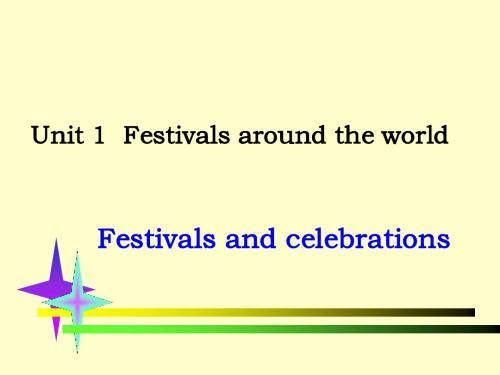
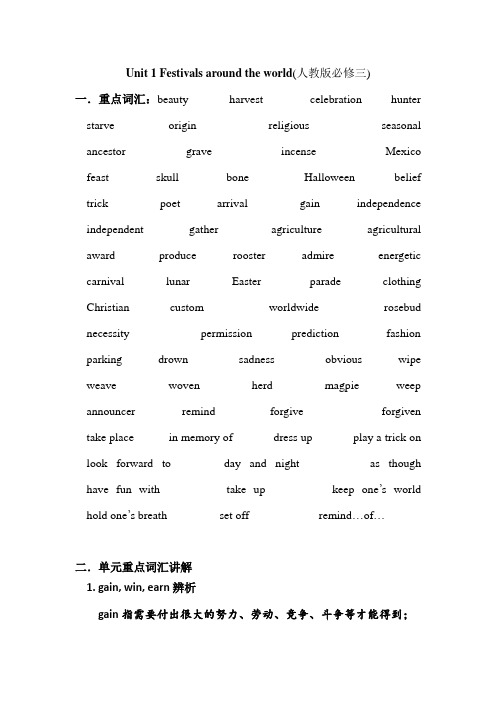
Unit 1 Festivals around the world(人教版必修三)一.重点词汇:beauty harvest celebration hunter starve origin religious seasonal ancestor grave incense Mexico feast skull bone Halloween belief trick poet arrival gain independence independent gather agriculture agricultural award produce rooster admire energetic carnival lunar Easter parade clothing Christian custom worldwide rosebud necessity permission prediction fashion parking drown sadness obvious wipe weave woven herd magpie weep announcer remind forgive forgiven take place in memory of dress up play a trick on look forward to day and night as though have fun with take up keep one’s world hold one’s breath set off remind…of…二.单元重点词汇讲解1. gain, win, earn辨析gain指需要付出很大的努力、劳动、竞争、斗争等才能得到;win指在较强的竞争中取得胜利或赢得某物,其后常接game, war, prize, fame, battle, medal等名词作其宾语;earn通常接金钱、报酬、谋生、地位等名词,暗示获得物与所花的力气成比例。
必修三第一单元Festivals around the world单词导学案
一、重点单词
1.mean v. (mean-- -- ) adj.
mean to do mean doing
词汇变形:n. 意义意思-- adj. 有意义的
n. 方法手段(单复数同型)
练习:1> Do you mean (go) to his party without any gifts?
2>Doing nothing means (gain) nothing.
3>Every means (have) been tried by now.
2.celebrate v. -- n.
in celebration of 辨析:celebrate / congratulate / anniversary
3.starve v. -- n.
饿死渴望做某事
渴望某事
4.origin n. -- adj. -- adv.
起源于
5.honor n. v.
为了纪念
翻译:和你共进晚餐,我深感荣幸。
6.belief n. -- v.
相信
7.arrival n. -- v.
常见的-al为名词后缀:
8.independence n. --adj. -- v. 依赖依赖依靠
It all depends. 练习:1>(2013全国卷)India (获得独立) in 1947,after a long struggle.
2>(2012福建卷)-What are you going to do this weekend?
- . If time permits, I may go to Shanghai with my friends.
A.Don’t mention it.
B. It doesn’t matter
C. Forget it.
D. It depends.
9.award n. v.
辨析:award / reward
10.admire v. --n. -- adj.
因为某事羡慕某人翻译:我们都很钦佩那位音乐家的才华。
11.fool n. v. adj.
make a fool of
欺骗某人做某事
12.permission n. --v. (-- -- )
允许做某事允许某人做某事未经允许
练习:We are permitted (carry) only the basic necessities to the deserted island.
13.apologize v. -- n.
因某事向某人道歉
14.obvious -- adv.
翻译:显然,李方在借酒消愁。
15.remind v. -- n.
拓展:”V. + sb. +of + sth.”相关短语
提醒某人某事提醒某人做某事
警告某人某事通知某人某事
使某人相信某事治愈某人的...病
抢某人某物使某人摆脱某事
指控某人某罪怀疑某人某事
16.forgive v. (-- -- )
因某事原谅某人
二、重点短语
1.take place ;不及物动词短语,用于被动语态。
同义短语:拓展: 代替
在适当位置首先第一
2.in memory of
in + n. + of 的常见短语:
寻找需要控制支持赞美拥有
3.play a trick on
=
4.look forward to to为。
5.as though (=as if)
as if后接与事实相反的情况,需要使用语气:
as though + 一般过去时(与现在事实相反)
过去完成时(与过去事实相反)
练习:1> They talked as if nothing unexpected (happen).
2>It is cloudy. It looks as though it (rain).
6.have fun
fun为,fun相关短语:
与某人玩得开心拿...开玩笑
7.turn up
turn down turn in turn on
turn off turn to turn out turn over
8.keep one’s word
失信换句话说总之
与某人谈话与某人吵架
无法用语言形容消息传来
9.hold one’s breath
喘不过气来深呼吸
词性转化:n. breath --v. -- adj.
10.set off
出发去某地
set相关短语:
着手做某事
set up set down set aside
三、重点句型
原文重现:It is obvious that the manager of the coffee shop was ...
考点提炼:
it作形式主语的常见句式:
It + be + adj. (possible/strange/natural/important)+that 从句
It + be +过去分词(said/thought/believed/reported/supposed)+that 从句
It + 不及物动词(seem/occur/happen)+that 从句
It + be +名词短语(a pity/ a fact/ an honor /a wonder/ no wonder)+that 从句练习:
1>他一定会来参加讨论。
he will come to the discussion.
2>真遗憾,我们不能走。
we can’t go.
3>我突然想起来锁前门。
I didn’t lock the front door.
4>据报道他赢了比赛。
he has won the game.。